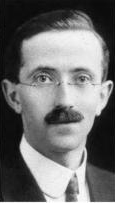
Douglas Macmillan
Encyclopedia

Order of the British Empire
The Most Excellent Order of the British Empire is an order of chivalry established on 4 June 1917 by George V of the United Kingdom. The Order comprises five classes in civil and military divisions...
(born 10 August 1884, in Castle Cary
Castle Cary
Castle Cary is a market town and civil parish in south Somerset, England, north west of Wincanton and south of Shepton Mallet.The town is situated on the River Cary, a tributary of the Parrett.-History:...
, Somerset
Somerset
The ceremonial and non-metropolitan county of Somerset in South West England borders Bristol and Gloucestershire to the north, Wiltshire to the east, Dorset to the south-east, and Devon to the south-west. It is partly bounded to the north and west by the Bristol Channel and the estuary of the...
, England
England
England is a country that is part of the United Kingdom. It shares land borders with Scotland to the north and Wales to the west; the Irish Sea is to the north west, the Celtic Sea to the south west, with the North Sea to the east and the English Channel to the south separating it from continental...
- died 1969) was a civil servant and charity founder. He was the seventh of eight children of William Macmillan (1844-1911) and his wife Emily (1843-1937). He was educated at Sexey's School
Sexey's School
Sexey's School is a state boarding school in Bruton, Somerset, England that also takes some day pupils from the surrounding area. Sexey's School is named after Hugh Sexey who, in 1599, was appointed as a Royal auditor to Elizabeth I and later as a Royal auditor to James I. Sexey's Hospital was...
, Bruton (1894-7), the Quaker Sidcot School, Winscombe (1897-1901), and then at the Birkbeck Literary and Scientific Institute, London (1901). Macmillan entered the civil service in London in 1902 and worked in the Board of Agriculture and, later, the Ministry of Agriculture and Fisheries, retiring as a staff officer in 1945.
The death of his father from cancer, in 1911, left a deep impression on Macmillan, and the following year he founded the Society for the Prevention and Relief of Cancer against a background of resistance. The National Health Service had yet to be established, and registration of nurses was not introduced until 1919. At the time no Health and Safety acts had been passed by Parliament and public health had yet to become a priority by the state. In setting up the society Macmillan "wanted to see homes for cancer patients throughout the land, where attention will be provided freely or at low cost, as circumstances dictate... [and]... panels of voluntary nurses who can be detailed off to attend to necessitous patients in their own homes." This organisation has since flourished and is today known as Macmillan Cancer Support
Macmillan Cancer Support
Macmillan Cancer Support is one of the largest British charities and provides specialist health care, information and financial support to people affected by cancer....
.
A blue plaque
Blue plaque
A blue plaque is a permanent sign installed in a public place to commemorate a link between that location and a famous person or event, serving as a historical marker....
was erected to honour him at his former residence of 15 Ranelagh Road, Pimlico
Pimlico
Pimlico is a small area of central London in the City of Westminster. Like Belgravia, to which it was built as a southern extension, Pimlico is known for its grand garden squares and impressive Regency architecture....
in 1997. In October 2010, The Bexley Civic Society invited the Mayor of Bexley, Cllr Val Clark, to unveil another plaque on his house in Knoll Road, Sidcup where he lived for 30 years.
Douglas Macmillan was a vegetarian. In 1909, he wrote an open letter to all Christians entitled 'SHALL WE SLAY' which encouraged orthodox Christians to consider vegetarianism.
Works
- Cancer research and vivisection, 1919.
- 'SHALL WE SLAY' 1909
- 'The various animals and fish exist as part of the intricate design of nature, and in our present state of ignorance it might not be easy in every case to state the precise use of each. But whether we regard them as the direct creations of God, manifesting His manifold diversity and wisdom, or as the varied offspring of our Mother Nature, the simple fact remains that they live more or less the same as we do, having similar organs, nerves, sensations of pain or pleasure, the same joy of life and fear of death, and the same right to live their full span upon the free earth.' Douglas Macmillan, The Better Quest, 1911
Further reading
- Pioneers of Their Time: The Stories of Douglas Macmillan MBE & Dame Ethel Smyth Denise Baldwin, Katherine Harding, Iris Morris, Lamorbey & Sidcup Local History Society, 1996. ISBN 0952466112

